11 Best Herbal Teas For Ankylosing Spondylitis
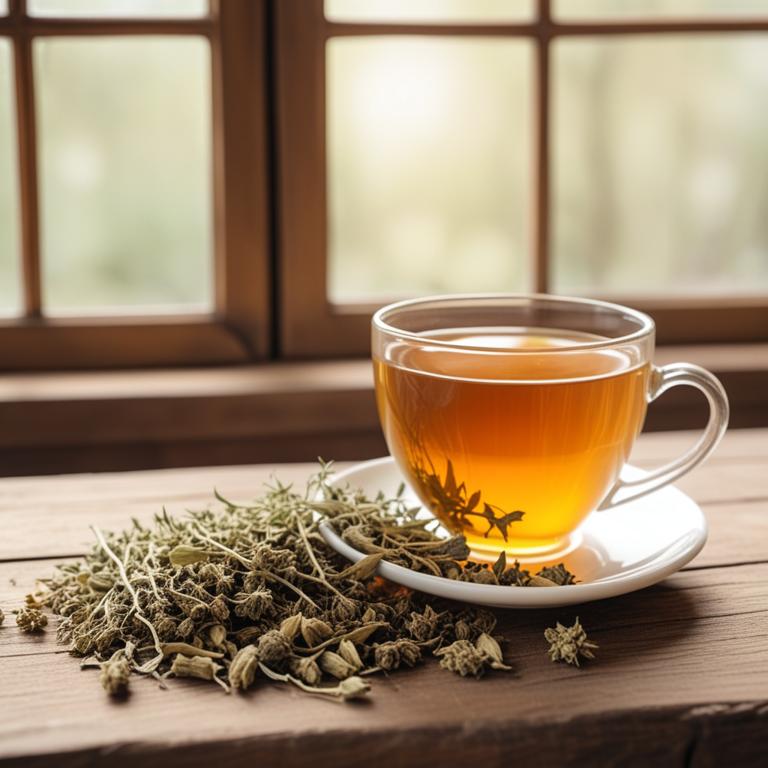
Herbal teas for Ankylosing spondylitis are natural remedies that have been used to alleviate the symptoms of this chronic inflammatory disease, which is characterized by severe, chronic pain and discomfort in the spine and other joints.
These herbal teas can provide relief from pain, inflammation, and stiffness, and may help to reduce the progression of the disease.
Some examples of herbal teas that have been used to treat Ankylosing spondylitis include ginger tea, which has anti-inflammatory properties and can help to reduce pain and inflammation; turmeric tea, which contains curcumin, a compound with potent anti-inflammatory and antioxidant effects; passionflower tea, which can help to reduce anxiety and promote relaxation; willow bark tea, which contains salicin, a compound similar to aspirin; and licorice root tea, which can help to reduce inflammation and promote healing.
Additionally, other herbal teas such as boswellia tea, meadowsweet tea, and nettle leaf tea have also been traditionally used to treat Ankylosing spondylitis due to their anti-inflammatory and pain-relieving properties.
According to the study, teas for ankylosing spondylitis, such as green tea, may be an effective and safe treatment for pain relief due to their antioxidant and anti-inflammatory properties, particularly due to the presence of Epigallocatechin-3-gallate (EGCG).
Below there's a list of the 11 best herbal teas for ankylosing spondylitis.
- 1. Boswellia serrata teas
- 2. Achillea millefolium teas
- 3. Curcuma longa teas
- 4. Rheum rhabarbarum teas
- 5. Urtica dioica teas
- 6. Zingiber officinale teas
- 7. Echinacea purpurea teas
- 8. Matricaria chamomilla teas
- 9. Silybum marianum teas
- 10. Camellia sinensis teas
- 11. Ginkgo biloba teas
Also you may be interested in...
TODAY'S FREE BOUNDLE
Herb Drying Checklist + Herbal Tea Shopping List + Medicinal Herbs Flashcards
Enter you best email address below to receive this bundle (3 product valued $19.95) for FREE + exclusive access to The Aphotecary Letter.
$19.95 -> $0.00
1. Boswellia serrata teas
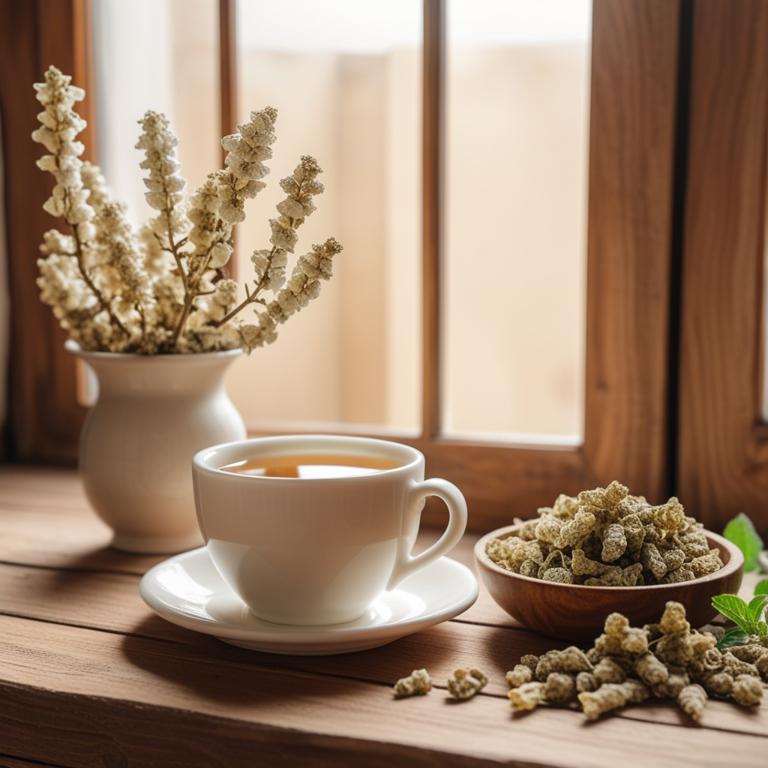
Boswellia serrata teas have been traditionally used to treat ankylosing spondylitis, a chronic inflammatory disease of the spine, due to their anti-inflammatory and analgesic properties.
The bioactive constituents of Boswellia serrata, including boswellic acids, acetyl-11-keto-β-boswellic acid (AKBA), and β-boswellic acids, help to reduce inflammation and alleviate pain by inhibiting the production of pro-inflammatory enzymes and cytokines.
By consuming Boswellia serrata teas, individuals with ankylosing spondylitis may experience relief from symptoms such as stiffness, pain, and limited mobility, ultimately improving their quality of life.
The benefits of using Boswellia serrata teas to treat ankylosing spondylitis include reduced reliance on non-steroidal anti-inflammatory drugs (NSAIDs) and a lower risk of adverse effects associated with long-term NSAID use.
Related Study
According to "Phytotherapy research : PTR", Boswellia serrata teas may be an effective treatment option for ankylosing spondylitis as it was found to be more effective than both placebo and valdecoxib for improvement of pain and physical function in patients with osteoarthritis, which is a related condition.
2. Achillea millefolium teas

Achillea millefolium teas, also known as yarrow tea, have been traditionally used to treat ankylosing spondylitis, a type of arthritis that affects the spine.
The anti-inflammatory and analgesic properties of this herbal preparation help to alleviate pain and inflammation in the joints, reducing stiffness and improving mobility.
The bioactive constituents of yarrow tea, including flavonoids, sesquiterpenes, and phenolic acids, have been found to inhibit the production of pro-inflammatory cytokines, which contribute to the development of ankylosing spondylitis.
The benefits of yarrow tea in treating ankylosing spondylitis include reduced joint pain and inflammation, improved quality of life, and a decrease in the risk of disease progression.
3. Curcuma longa teas

Curcuma longa teas, derived from the turmeric plant, have been traditionally used to treat ankylosing spondylitis, a chronic inflammatory disease affecting the spine.
The anti-inflammatory and antioxidant properties of Curcuma longa teas, particularly the bioactive constituents curcumin and demethoxycurcumin, help to reduce inflammation and alleviate symptoms such as pain and stiffness.
By inhibiting the production of pro-inflammatory enzymes and cytokines, Curcuma longa teas help to treat ankylosing spondylitis by reducing inflammation and promoting healing in the affected joints and spine.
The benefits of using Curcuma longa teas to treat ankylosing spondylitis include reduced pain and stiffness, improved joint mobility, and enhanced quality of life.
4. Rheum rhabarbarum teas
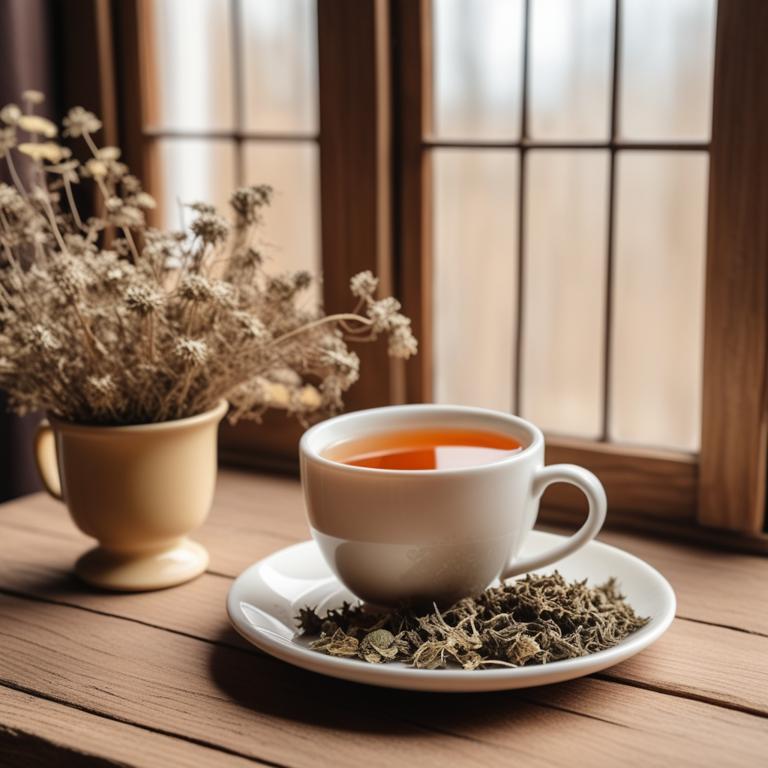
Rheum rhabarbarum teas have been traditionally used to treat ankylosing spondylitis, an inflammatory condition that affects the spine and other joints.
The anti-inflammatory and antioxidant properties of Rheum rhabarbarum teas, which are attributed to its bioactive constituents such as anthraquinones and flavonoids, help to reduce inflammation and oxidative stress in the body, thereby alleviating symptoms of ankylosing spondylitis.
By reducing inflammation and promoting tissue repair, Rheum rhabarbarum teas can help to slow down the progression of ankylosing spondylitis and improve quality of life for those suffering from this condition.
The benefits of using Rheum rhabarbarum teas to treat ankylosing spondylitis include reduced pain and stiffness, improved joint mobility, and enhanced overall well-being.
5. Urtica dioica teas

Urtica dioica teas, also known as stinging nettle tea, have been traditionally used to treat ankylosing spondylitis, an inflammatory disease affecting the spine.
The anti-inflammatory and immunomodulatory properties of this herbal preparation help to reduce inflammation and alleviate symptoms associated with the condition.
The bioactive constituents, including flavonoids, phenolic acids, and alkaloids, found in stinging nettle tea, contribute to its therapeutic effects by reducing oxidative stress and modulating the immune response.
By consuming stinging nettle tea, patients with ankylosing spondylitis may experience benefits such as reduced pain, improved mobility, and enhanced overall quality of life.
6. Zingiber officinale teas

Zingiber officinale teas, derived from the root of the ginger plant, have been traditionally used to treat ankylosing spondylitis, a chronic inflammatory disease affecting the spine.
The anti-inflammatory properties of this herbal preparation help to reduce inflammation and alleviate pain, thereby providing relief from the symptoms of ankylosing spondylitis.
The bioactive constituents of Zingiber officinale, including gingerols and shogaols, have been found to exhibit potent anti-inflammatory and antioxidant activities, which contribute to its therapeutic effects.
Regular consumption of Zingiber officinale teas has been shown to improve joint mobility, reduce stiffness, and enhance overall quality of life in individuals suffering from ankylosing spondylitis.
Related Study
According to the study, Zingiber officinale teas are not specifically mentioned for ankylosing spondylitis, but as one of the medicinal plants with direct evidence in the management of osteoarthritis, suggesting its potential anti-inflammatory and anti-nociceptive properties could be beneficial for conditions with joint inflammation like ankylosing spondylitis.
7. Echinacea purpurea teas

Echinacea purpurea teas have been traditionally used to help alleviate symptoms of ankylosing spondylitis, a chronic inflammatory condition that affects the spine.
The anti-inflammatory and immunomodulatory properties of this herbal preparation make it beneficial in treating this ailment.
The bioactive constituents of Echinacea purpurea, including alkylamides, glycosides, and phenolic acids, help to reduce inflammation and modulate the immune system, thereby providing relief from the symptoms of ankylosing spondylitis.
The benefits of using Echinacea purpurea teas to treat ankylosing spondylitis include reduced pain and stiffness, improved joint mobility, and enhanced overall quality of life.
8. Matricaria chamomilla teas
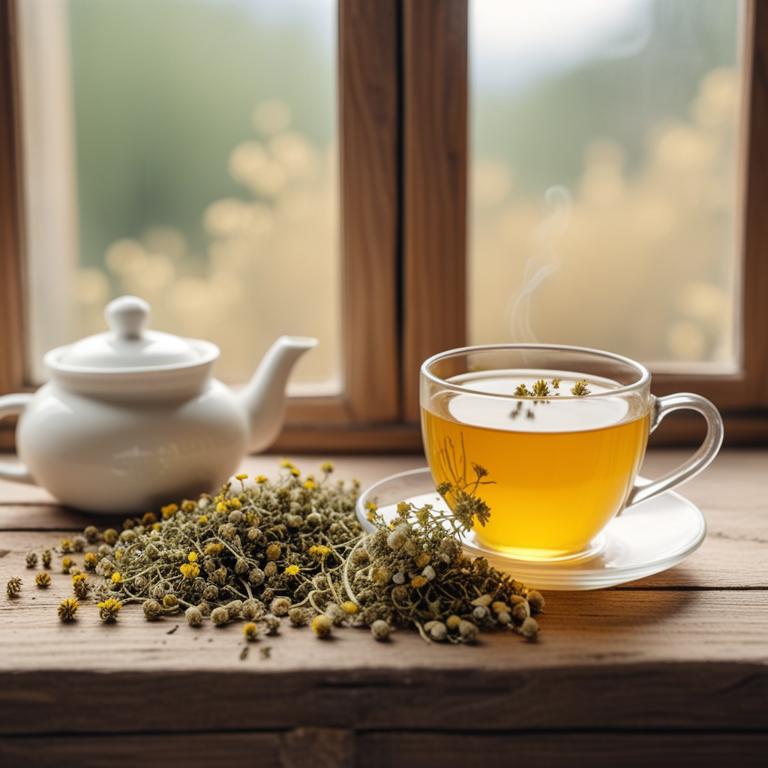
Matricaria chamomilla teas have been traditionally used to treat ankylosing spondylitis, an inflammatory disease that affects the spine.
The anti-inflammatory and antioxidant properties of this herbal preparation help to reduce inflammation and alleviate pain associated with this ailment.
The bioactive constituents, including apigenin, luteolin, and chamazulene, have been shown to inhibit the production of pro-inflammatory cytokines and enzymes, thereby reducing inflammation and promoting healing.
By reducing inflammation and oxidative stress, Matricaria chamomilla teas may help to alleviate symptoms of ankylosing spondylitis, such as back pain, stiffness, and limited mobility.
9. Silybum marianum teas

Silybum marianum teas have been studied for their potential in treating ankylosing spondylitis, a chronic inflammatory disease affecting the spine.
The anti-inflammatory and antioxidant properties of silymarin, a key bioactive constituent of Silybum marianum, help to reduce inflammation and oxidative stress, thereby alleviating symptoms of ankylosing spondylitis.
The flavonoids and terpenoids present in Silybum marianum teas are believed to modulate immune responses, reducing the production of pro-inflammatory cytokines and promoting tissue repair.
The benefits of Silybum marianum teas in treating ankylosing spondylitis include reduced pain and stiffness, improved joint mobility, and enhanced quality of life for patients.
10. Camellia sinensis teas
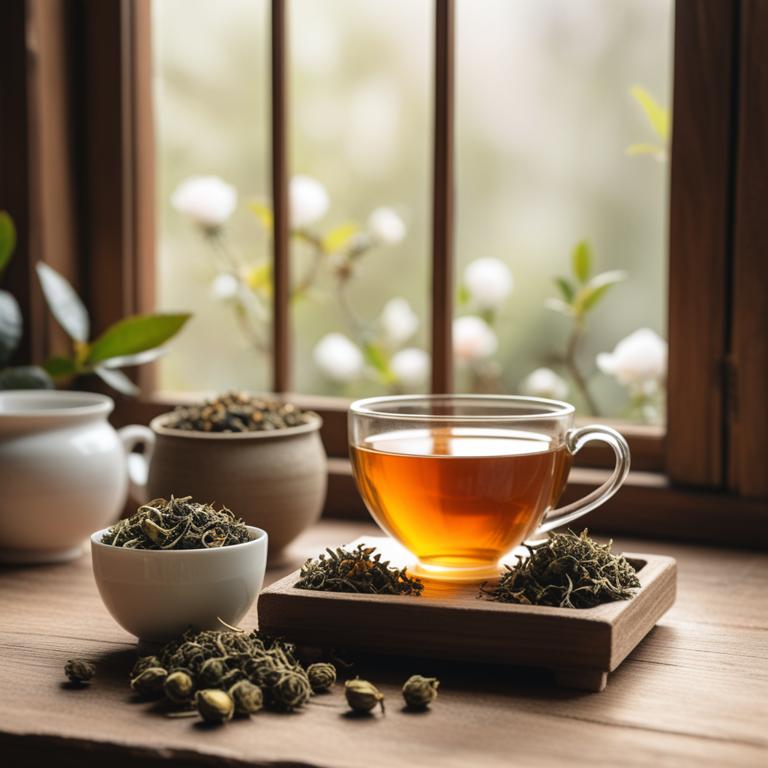
Camellia sinensis teas, derived from the leaves of the Camellia sinensis plant, have been traditionally used to treat ankylosing spondylitis, a chronic inflammatory disease affecting the spine and other joints.
The anti-inflammatory and antioxidant properties of these teas help to reduce inflammation and pain associated with ankylosing spondylitis, promoting relaxation and soothing of the muscles.
The bioactive constituents of Camellia sinensis teas, such as theaflavins and thearubigins, have been found to have potent anti-inflammatory and antioxidant effects, which aid in reducing the severity of ankylosing spondylitis symptoms.
Regular consumption of Camellia sinensis teas has been reported to provide relief from ankylosing spondylitis symptoms, improve joint mobility, and enhance overall well-being, making it a promising natural remedy for this condition.
11. Ginkgo biloba teas

Ginkgo biloba teas have been studied for their potential benefits in treating ankylosing spondylitis, a chronic inflammatory condition affecting the spine.
The anti-inflammatory and antioxidant properties of this herbal preparation help to reduce inflammation and oxidative stress, which are key factors in the development of ankylosing spondylitis.
The bioactive constituents of Ginkgo biloba teas, including flavonoids, terpenoids, and bilobalide, work synergistically to modulate the immune system and reduce inflammation, thus alleviating symptoms such as pain and stiffness.
Regular consumption of Ginkgo biloba teas has been found to improve joint mobility, reduce pain and inflammation, and enhance overall quality of life for individuals suffering from ankylosing spondylitis.